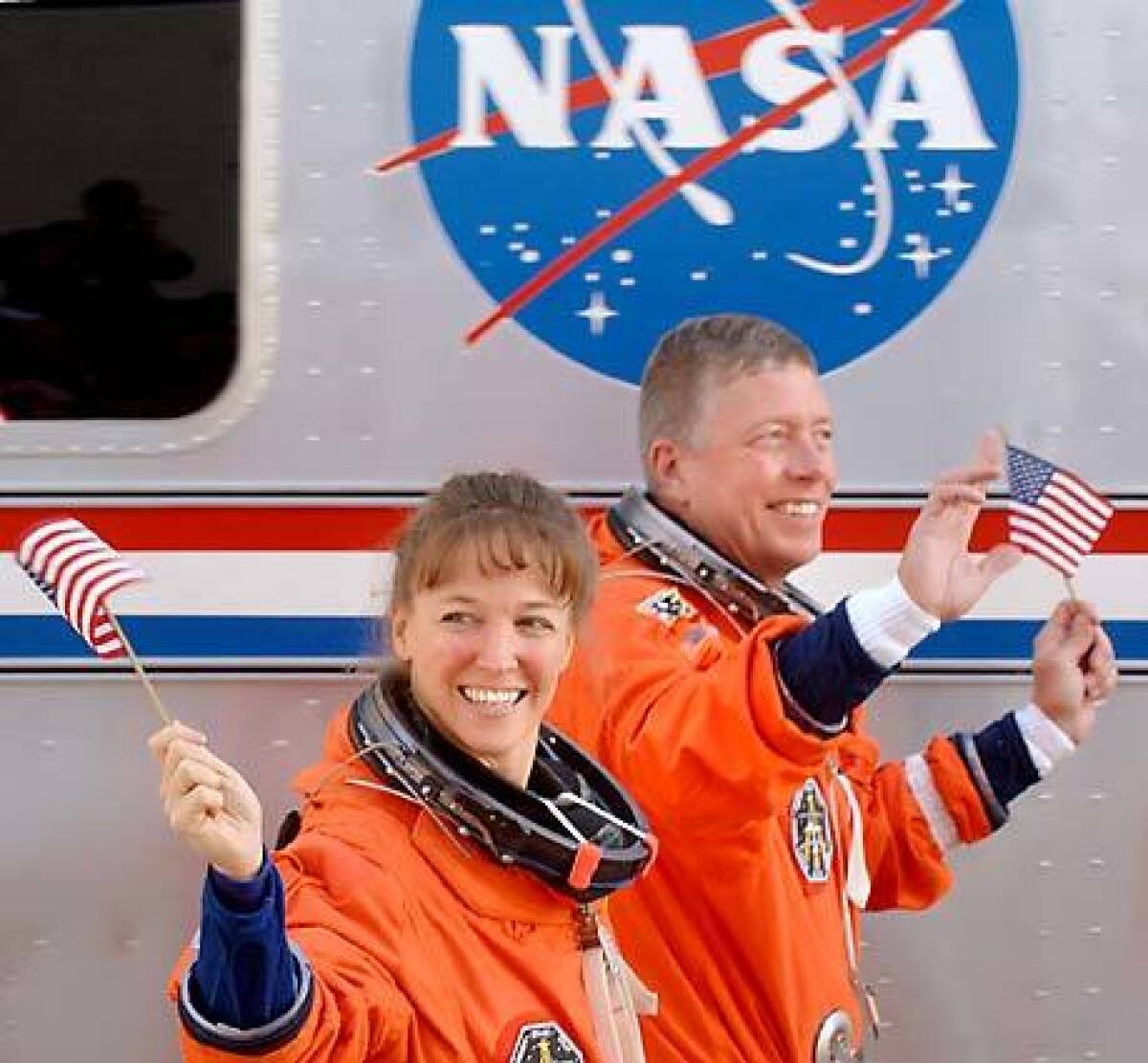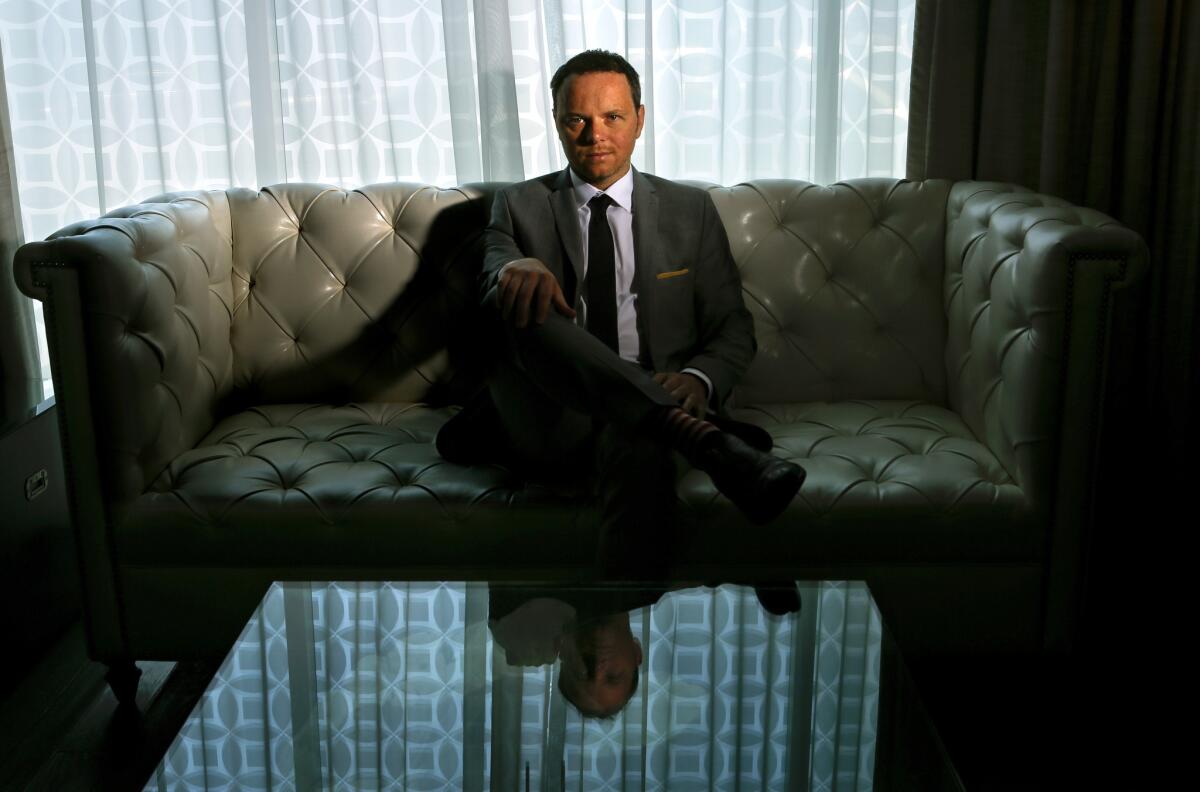If you’re expecting diapers in the astronaut story ‘Lucy in the Sky,’ think again
- Share via
TORONTO — If there’s one thing people associate with Lisa Nowak, it’s diapers.
After returning home from her first space mission, the astronaut went on a 950-mile drive from Houston to Orlando, Fla. She had gone to confront a U.S. Air Force engineer who was sleeping with the man Nowak had an affair with. In February 2007, when she was captured by Florida authorities, she told the police she’d brought a slew of questionable items on her journey: a buck knife, latex gloves, a BB gun, pepper spray. She also had in her possession government-issued diapers, which she used to minimize pit stops on her long drive.
Not only was the then-43-year-old the first active-duty astronaut believed to have ever been arrested on felony charges, the diapers became infamous, turning Nowak into a tabloid headline, a “Saturday Night Live” reference and the butt of the joke in the 2017 comedy “Rough Night.”
Of course, Nowak’s actual story was far more layered than the punchlines suggested. And now a film debuting at the Toronto International Film Festival on Wednesday, “Lucy in the Sky,” is inspired — loosely — by that story. The film, directed by television veteran Noah Hawley (“Fargo,” “Legion”), is not directly based on Nowak’s life. The former NASA employee had no involvement in the Fox Searchlight project, and the lead character, played by Natalie Portman, is named Lucy.
But just how much of the film, out Oct. 4, is based on real life? Before heading to Toronto, Hawley called from his home in Austin, Texas, to discuss the similarities and differences between his film and Nowak’s case.

How familiar were you with Lisa Nowak before signing onto the movie?
I had a memory of a moment in time when the real story made headlines. But I didn’t know a lot of it, other than the tabloid details. What was interesting to me, as I thought about taking this on, was what’s really behind a tabloid story? A human being with dignity who made some bad choices and ended up in a story that is now smaller than it should be. Her human experience has been reduced to a joke, on some level. I wanted to try to tell that story, and allow her to retain her dignity — but you now understand what she did, and now it’s a tragedy and not a farce. As a tragedy, she can find some redemption.
This is your first film, following the creation of the FX shows “Fargo” and “Legion.” Why this project as your directorial debut?
I’ve never made anything you can watch in one sitting before, which was a really interesting challenge. The question became: If I was going to make a movie, it should give you an experience you can only have in the theater. Therefore, it should be something immersive — something you can use that big room and screen for that wasn’t an action movie.
The script that I read ... was a story of a psychological decline that had these elements of magical realism in it. It was a film about trying to understand decisions someone made that aren’t understandable. She had everything and was at the top of the world, literally, but then things unraveled. Especially after “Legion,” I was interested in something subjective that immerses you in her point of view.
A big part of Lucy’s journey is how difficult it can be for astronauts to return to everyday life after experiencing space. How much research did you do into that emotional experience?
When you start reading about astronauts — and this is not to say all astronauts — but many go up and have an existential crisis and are changed by it in some dramatic way. A few have become really vehement environmentalists.
There is a certain amount of liberty that I took in terms of following this character’s story and where I needed it to go. But, I mean, we don’t send poets into space. We send these left-brain, engineer types. They see a problem and they solve it — very linear, literal thinkers. To expose them to a celestial experience that can’t be articulated ... What happens when you take that left-brain, never-met-a-problem-she-couldn’t-solve person and introduce a question bigger than anyone can answer?
Why did you decide to have the film “inspired by” Nowak’s story instead of based on it?
It never really occurred to me to literally tell the story, on one hand. On the other hand, when Fox Searchlight came to me with this film, there weren’t life rights that had been optioned. So the mission was never to tell the actual story. The fact that I was interested in a more fictionalized version of it was helpful, on some level, because you can get into legal issues in telling someone’s life story.
Spoiler alert: The diapers are not actually a part of the movie. Why didn’t you want to include them?
Given that it’s not a documentary, part of the work I did was trying to create a character journey that you could really relate to and stay with, even when she went to places you didn’t want her to go. That detail just didn’t fit into the story.

When you first signed onto the movie, Reese Witherspoon was attached to star. How did Portman end up with the part instead?
Reese Witherspoon had set the project up at Searchlight as a producer with the idea that she might star in it. I came on while we were still having those conversations. But Reese got busy — “Big Little Lies” had come out, and she was doing this Apple show, so she was no longer available. And my first thought was Natalie. I find that she has a really compelling ability to play characters under pressure. “Black Swan” is an example of a very high-strung, perfectionist character that’s really compelling to watch and very humanizing.
One of the things that was really exciting to me ... is that she actually is a very charismatic woman. She has a real positive energy to her ... she’s very calm, but also has a very confident swagger to her that’s very “The Right Stuff.”
Lucy’s hairstyle is pretty distinctive. How did you and Natalie settle on the look?
I just had this Dorothy Hamill image in my head, and luckily Natalie was game. The movie had to be a period piece, because we don’t fly the space shuttle anymore. A lot of the fashion was informed by that. She’s not someone who cares much about clothes, so the goal was to make her Midwestern on some level. Make her feel like she shops at the stores that people shop at. She’s not up on the latest trends, and has a very practical haircut.
In exploring Lucy’s feelings, the film comments on women who are perceived as “too emotional.” Why was that a question you wanted to explore?
I believe that gender played a role in this story, and to not comment on it would be to ignore something really important. This is not a movie about a woman who falls apart because she is too emotional about a man, and the calibration of that was really important to me. The affair she has is symptomatic of a larger crisis she has. And we thought a lot about, “How far is too far?” How do we shape this character in a way where she’s really at sea and swimming, looking for some kind of grounding, and the only other person who understands that is another astronaut?
There was a danger that this movie becomes “Fatal Attraction.” It’s a difficult story to tell, on some level, because audiences tend to have an intrinsic dislike of someone who cheats on their spouse. The fact that she wants to get back [to space] so desperately begins to make her push away from the more logical choices she might make. She probably knows this is not a love story she is in, but she wants to feel that feeling.
Why do you think Nowak’s story turned into such a tabloid sensation?
I think in many societies — not just our own — there’s an attraction to stories about characters brought low, on some level, by their own success. A schadenfreude attraction — I think that’s what tabloid stories are. A judgment on people we feel who have hubris and end up in situations that are really degrading.
Would you be interested in meeting Nowak, or having her see the film?
I’m not sure how people survive the things they survive and come back from them afterward. So on a human level, I would be interested to know what the journey was for her. But I respect her privacy. She has had so much unwanted attention that that’s not a conversation I’m asking her for.
More to Read
Only good movies
Get the Indie Focus newsletter, Mark Olsen's weekly guide to the world of cinema.
You may occasionally receive promotional content from the Los Angeles Times.











